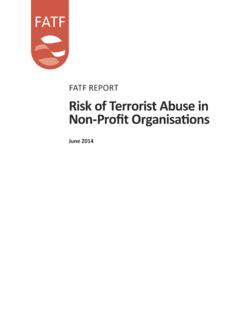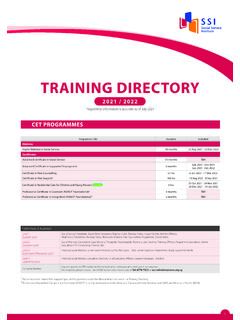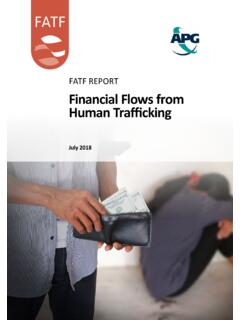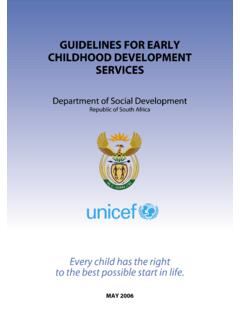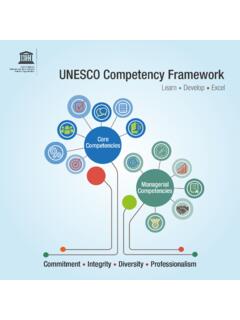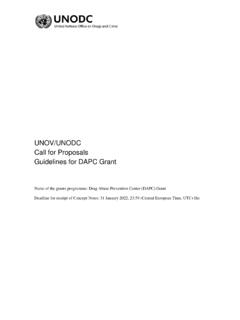Transcription of Understanding competition law - GOV.UK
1 Understanding competition lawAbuse of a dominant position Competitionlaw 2004 Since 1 May 2004 not only the European Commission, but also the Office ofFair Trading (OFT) has the power to apply and enforce Articles 81 and 82 ofthe EC Treaty in the United Kingdom. The OFT also has the power to applyand enforce the competition Act 1998. In relation to the regulated sectors thesame provisions are applied and enforced, concurrently with the OFT, by theregulators for communications matters, gas, electricity, water and sewerage,railway and air traffic services (under section 54 and schedule 10 of theCompetition Act 1998) (the Regulators). Throughout the guidelines, referencesto the OFT should be taken to include the Regulators in relation to theirrespective industries, unless otherwise following are the Regulators: the Office of Communications (OFCOM) the Gas and Electricity Markets Authority (OFGEM) the Northern Ireland Authority for Energy Regulation (OFREG NI) the Director General of Water Services (OFWAT) the Office of Rail Regulation (ORR), and the Civil Aviation Authority (CAA).
2 Section 52 of the competition Act 1998 obliges the OFT to prepare andpublish general advice and information about the application andenforcement by the OFT of Articles 81 and 82 of the EC Treaty and theChapter I and Chapter II prohibitions contained in the competition Act guideline is intended to explain these provisions to those who are likelyto be affected by them and to indicate how the OFT expects them to information on how the OFT has applied and enforced competitionlaw in particular cases may be found in the OFT s decisions, as available onits website from time to guideline is not a substitute for the EC Treaty nor forregulations made under it. Neither is it a substitute for EuropeanCommission notices and guidelines. Furthermore, this guideline isnot a substitute for the competition Act 1998 or the Enterprise Act2002 and the regulations and orders made under those Acts.
3 Itshould be read in conjunction with these legal instruments,Community case law and United Kingdom case law. Anyone in doubtabout how they may be affected by the EC Treaty, the CompetitionAct 1998 or the Enterprise Act 2002 should seek legal addition to its obligations under Community law, when dealing withquestions in relation to competition within the United Kingdom arising underPart I of the competition Act 1998, the OFT will act in accordance with section60 of that LAW GUIDELINEC ontentsDecember 2004 PartPage1 Introduction22 Abuse of a dominant position: the provisions33 Relationship between EC and national competition law84 Dominance115 Abuse186 Informal advice and opinions202 competition LAW GUIDELINE1 IntroductionAbuse of a dominant position1 The Treatyestablishing theEuropean Regulation(EC) No 1/2003 of 16 December 2002 on theimplementation of therules on competitionlaid down in Articles 81and 82 of the Treaty(OJ L1, , p.)
4 1). EC Treaty1and the competition Act 1998 (the Act) both prohibit,in certain circumstances, conduct by one or more undertakings whichamounts to an abuse of a dominant position. The prohibitions are setout in Article 82 of the EC Treaty (Article 82) and section 18(1) of theAct (the Chapter II prohibition). EC Regulation 1/2003 (theModernisation Regulation)2requires the designated nationalcompetition authorities of the Member States (NCAs) and the courtsof the Member States to apply and enforce Article 82 as well asnational competition law when national competition law is applied toan abuse prohibited by Article 82. guideline explains how the OFT will operate its powers under theAct and under the Modernisation Regulation in assessing the conductof dominant undertakings.
5 It indicates some of the factors which theOFT considers are relevant in determining whether an undertaking isdominant and whether its behaviour will or may be regarded asabusive. is intended that this guideline should be of assistance not only tothose undertakings which are dominant in their market or markets,but also to their customers and other businesses. In addition to thisguideline, the competition law guideline Assessment of market power(OFT415) provides further guidance on how the OFT assessesdominance. scope and application of Article 82 and the Chapter II prohibitionare explained in Part 2 of this guideline. Part 3 of the guideline dealswith the relationship between EC and national competition law. Parts4 and 5 consider the definitions of dominance and abuse OFT offers confidential informal advice to undertakings, and may,in certain circumstances, publish written guidance in the form of anOpinion.
6 Further details about this can be found in Part LAW GUIDELINE2 Abuse of a dominantposition: the provisionsDecember 20043 The termundertaking is notdefined in the EC Treatyor the Act, but itsmeaning has been setout in Community covers any natural orlegal person engaged ineconomic activity,regardless of its legalstatus and the way inwhich it is financed. Itincludes companies,partnerships, firms,businesses, individualsoperating as soletraders, agriculturalcooperatives,associations ofundertakings ( tradeassociations), non-profitmaking organisationsand (in somecircumstances) publicentities that offer goodsor services on a givenmarket. Scope of the OFT is empowered to apply two substantive provisions whichprohibit conduct by one or more dominant undertakings3whichamounts to abusive behaviour: Article 82 and the Chapter IIprohibition.
7 The Chapter II prohibition is based on Article 82. Article 82provides that:'Any abuse by one or more undertakings of a dominant positionwithin the common market or in a substantial part of it shall beprohibited as incompatible with the common market in so far as itmay affect trade between Member States.'The Chapter II prohibition provides that:'..any conduct on the part of one or more undertakings whichamounts to the abuse of a dominant position in a market isprohibited if it may affect trade within the United Kingdom.' tests applied under Article 82 and the Chapter II prohibition havetwo common elements: whether an undertaking is dominant in arelevant market; and, if so, whether it is abusing that dominantposition. The prohibition under both Article 82 and the Chapter IIprohibition is on the abuseof the dominant position, not the holdingof the position.
8 The OFT would find an undertaking's behaviour anabuse only after detailed examination of the market concerned andthe effects of the undertaking's conduct. 82 applies to conduct which 'may affect trade betweenMember States'. The case law of the European Court has interpretedthis phrase broadly. Given the breadth of this interpretation, it is likelythat in many cases conduct will be caught by both Article 82 and theChapter II prohibition (see paragraphs to for further details onthe application of this test). determining whether Article 82 and/or the Chapter II prohibitionapply, the dominant position must be held within the appropriateterritory. In the case of Article 82, the dominant position must be heldwithin the common market or in a substantial part of it.
9 In the case ofthe Chapter II prohibition, the dominant position must be held within4 competition LAW GUIDELINEA buse of a dominant position4 Section 18(2) of Regulation(EC) No 139/2004 onthe control ofconcentrationsbetween undertakings.(OJ L24, , p. 1 22).the United Kingdom or any part of it. It is possible that a dominantposition held within the United Kingdom or any part of it may alsoconstitute a dominant position held within the common market or asubstantial part of it (see paragraphs to below). Article 82 and the Chapter II prohibition provide, in similar terms,that conduct may constitute an abuse if it consists of:(a) directly or indirectly imposing unfair purchase or selling prices orother unfair trading conditions(b) limiting production, markets or technical development to theprejudice of consumers(c) applying dissimilar conditions to equivalent transactions withother trading parties, thereby placing them at a competitivedisadvantage(d) making the conclusion of contracts subject to acceptance by theother parties of supplementary obligations which, by their natureor according to commercial usage, have no connection with thesubject of the are no more than examples, and are not exhaustive.
10 Theimportant issue is whether the dominant undertaking is using itsdominant position in an abusive way. This may occur if it usespractices that have the effect of restricting the degree of competitionwhich it faces, or of exploiting its market position unjustifiably. the concept of an exclusionis not specifically recognised inrelation to Article 82, under EC law certain types of conduct are, ineffect, excluded from the application of Article 82. These includeconduct: which would result in a concentration with a Community dimension and thereby be subject to the EC Merger Regulation5, or5 competition LAW GUIDELINED ecember 20046A domestic exclusiondoes not, however,exclude conduct fromapplicable EC law. Anyconduct affecting tradebetween MemberStates that is excludedunder the Act remainssubject to Article 82,unless there is anequivalent exclusion atEC level.










